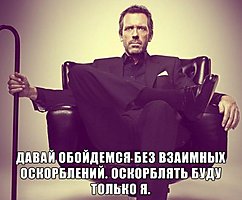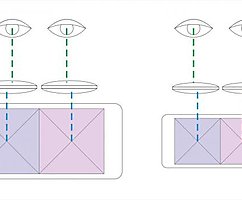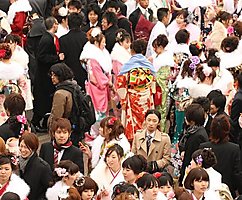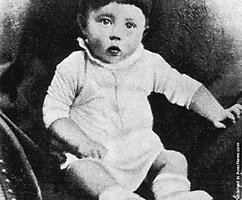What happens to the brain when we "klyuem nose"
 Bashny.Net
Bashny.Net
Everyone who at least once was driving after a day on my feet or sitting on important lectures after a sleepless night, knows the feeling, you command your brain to "not sleep!" and the eyelids getting heavier and heavier...
What happens at the moment when the eyes close, and then the man, pulling his head dazedly opens his eyes? Christian Jarrett, author of the book ‘Great Myths of the Brain’ learned response from Singapore neuroscientists, who conducted studies on this topic.
18 participants in the experiment for 22 hours straight not sleeping, then they were placed in the twilight, in the scanner, brain activity, and were instructed not to sleep and to keep my eyes open.
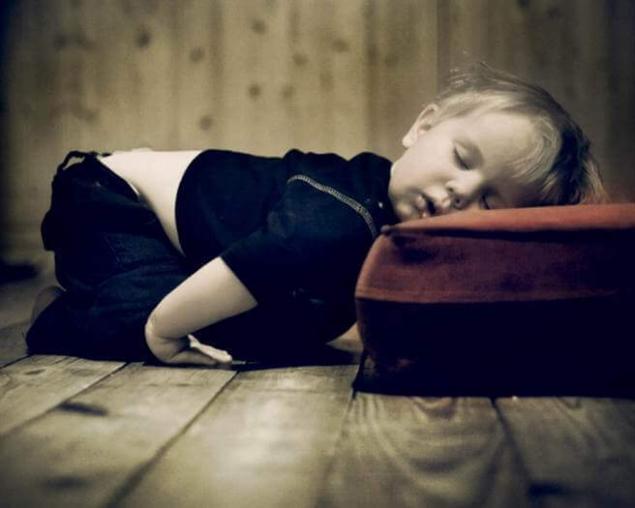
Of course, the eye ispytuemykh and shut by themselves, despite the fact that they were immediately pulled from sleep the audio recording of a voice resembling that of the eyes should be open. Researchers paid attention on what was happening in the brain at that moment, when eyes for a moment involuntarily closed. To make sure that they are dealing not just with the activity that occurs at any closing of the eyes, it was a scanning of the same people in the awake condition — they are simply asked to blink at regular intervals.
When ever participants involuntarily closed for a few moments (some researchers call this state "microcon") — one of the conspicuous changes has been the reduced activity in the thalamus (the part which is under the cerebral cortex and is often described as a brain extender). It works as a gateway, filtering sensory information that is sent to the brain for further processing. Okay, this makes sense: as soon as the participants "cut down", they lost contact with the outside world.
Another amazing moment, especially given the fact that we used to take a dream vacation when ever the subjects were closed, the scanner of brain activity immediately caught by the impressive jump in activity in several brain regions, including those responsible for sensation, movement of the body, emotions, consciousness and memory. But other areas, such as anterior cingulate cortex (which is sometimes jokingly referred to as ‘oh shit Board’ for its role in error monitoring) suddenly demonstrated a decrease in the activity. But scientists more surprised by the fact that microcon causes increased activity of the frontal and rear parts of the brain responsible for attention. In the test for the subjects slept, closing the eyes consciously, this effect is not repeated.
What we are given knowledge about all these neuro-activity that occur when we lose the battle for Wake? There are studies, which describe why if you Wake up someone who just fell asleep, that someone will feel strange vivid sensations and visions, which usually compare with the hypnotic sensations. It seems that this is just a consequence of the surge of activity in different sensory and emotional areas of the brain, which is triggered at the moment when the eyes are closed.
As soon as you slip out of the state of consciousness, the brain immediately slips you a film of sleep. But for microsleep the brain chooses to show b-movies, instead of the decent movies from REM sleep. A study conducted in the 90s confirms this thought: the subjects were constantly woken up as soon as they went to find out what hypnotic experiences they will feel. Only a small part of the participants voiced those ordinary miracles that are inherent in ordinary dreams, but the big part pay attention to the confusing effects similar to hallucinations.
However, even with this rapid increase of our domestic cinema in the real world, it is not yet clear why we feel so disoriented when waking. But the bursts of activity in areas of the brain responsible for attention, probably reflect an attempt of the brain to listen to the futile commands of its owner to stay awake and not sleep.
This, incidentally, is a good example of that at any point in time, our conscious experience is the result of a hidden, inner neural tug-of-war — what we notice, what we remember, what we choose, and in this case sleeping, even if we really are awake, it still boils down to the struggle between konkureerida neural networks.
Sorry, no practical advice on how to win this fight with sleep as lack of sleep, will not. But, agree, it was interesting to see what happens in the mind in the moment when we briefly "pass out". published
P. S. And remember, only by changing their consumption — together we change the world! © Join us at Facebook , Vkontakte, Odnoklassniki
Source: brainhack.me/2015/07/brain-cant-stay-awake/
What happens at the moment when the eyes close, and then the man, pulling his head dazedly opens his eyes? Christian Jarrett, author of the book ‘Great Myths of the Brain’ learned response from Singapore neuroscientists, who conducted studies on this topic.
18 participants in the experiment for 22 hours straight not sleeping, then they were placed in the twilight, in the scanner, brain activity, and were instructed not to sleep and to keep my eyes open.

Of course, the eye ispytuemykh and shut by themselves, despite the fact that they were immediately pulled from sleep the audio recording of a voice resembling that of the eyes should be open. Researchers paid attention on what was happening in the brain at that moment, when eyes for a moment involuntarily closed. To make sure that they are dealing not just with the activity that occurs at any closing of the eyes, it was a scanning of the same people in the awake condition — they are simply asked to blink at regular intervals.
When ever participants involuntarily closed for a few moments (some researchers call this state "microcon") — one of the conspicuous changes has been the reduced activity in the thalamus (the part which is under the cerebral cortex and is often described as a brain extender). It works as a gateway, filtering sensory information that is sent to the brain for further processing. Okay, this makes sense: as soon as the participants "cut down", they lost contact with the outside world.
Another amazing moment, especially given the fact that we used to take a dream vacation when ever the subjects were closed, the scanner of brain activity immediately caught by the impressive jump in activity in several brain regions, including those responsible for sensation, movement of the body, emotions, consciousness and memory. But other areas, such as anterior cingulate cortex (which is sometimes jokingly referred to as ‘oh shit Board’ for its role in error monitoring) suddenly demonstrated a decrease in the activity. But scientists more surprised by the fact that microcon causes increased activity of the frontal and rear parts of the brain responsible for attention. In the test for the subjects slept, closing the eyes consciously, this effect is not repeated.
What we are given knowledge about all these neuro-activity that occur when we lose the battle for Wake? There are studies, which describe why if you Wake up someone who just fell asleep, that someone will feel strange vivid sensations and visions, which usually compare with the hypnotic sensations. It seems that this is just a consequence of the surge of activity in different sensory and emotional areas of the brain, which is triggered at the moment when the eyes are closed.
As soon as you slip out of the state of consciousness, the brain immediately slips you a film of sleep. But for microsleep the brain chooses to show b-movies, instead of the decent movies from REM sleep. A study conducted in the 90s confirms this thought: the subjects were constantly woken up as soon as they went to find out what hypnotic experiences they will feel. Only a small part of the participants voiced those ordinary miracles that are inherent in ordinary dreams, but the big part pay attention to the confusing effects similar to hallucinations.
However, even with this rapid increase of our domestic cinema in the real world, it is not yet clear why we feel so disoriented when waking. But the bursts of activity in areas of the brain responsible for attention, probably reflect an attempt of the brain to listen to the futile commands of its owner to stay awake and not sleep.
This, incidentally, is a good example of that at any point in time, our conscious experience is the result of a hidden, inner neural tug-of-war — what we notice, what we remember, what we choose, and in this case sleeping, even if we really are awake, it still boils down to the struggle between konkureerida neural networks.
Sorry, no practical advice on how to win this fight with sleep as lack of sleep, will not. But, agree, it was interesting to see what happens in the mind in the moment when we briefly "pass out". published
P. S. And remember, only by changing their consumption — together we change the world! © Join us at Facebook , Vkontakte, Odnoklassniki
Source: brainhack.me/2015/07/brain-cant-stay-awake/
Tags
See also
When there is no "mental vision": what happens in the mind
How the brain decides when we sleep and when to Wake up
What happens when you say "I love you"?
WHAT happens in our bodies when we experience fear
What's going on in the office when employees go home.
What happens to the ships
That's what happens to a man who does not sleep for a long time. Do not mess with it!
What happens to your body after you drank the bank "Cola"






